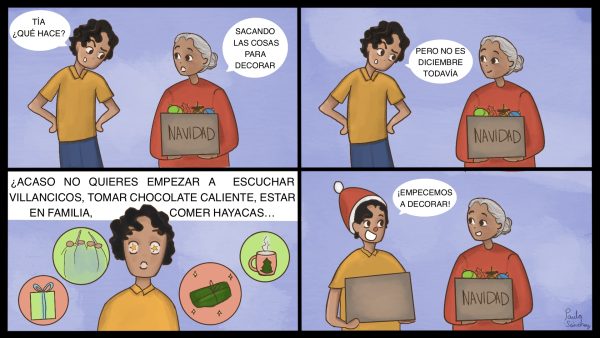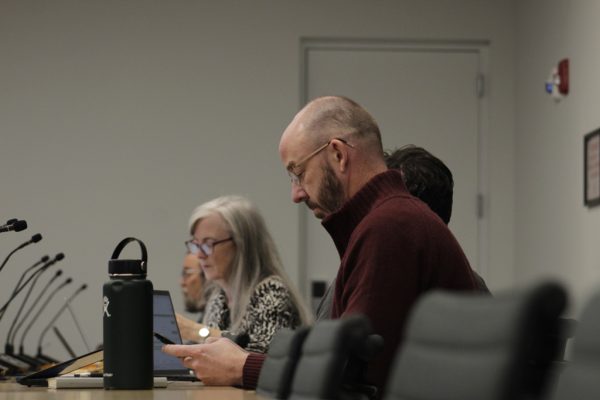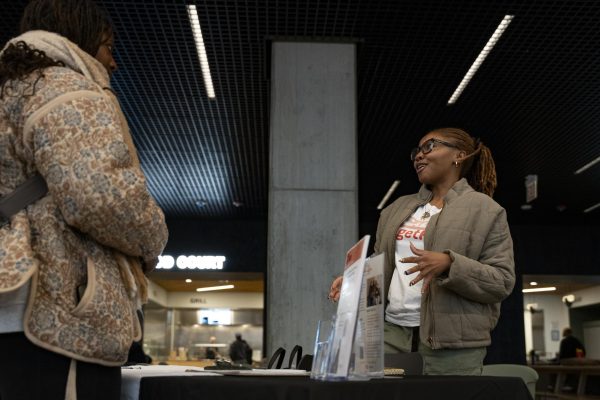‘War on my womanhood is not over’
October 2, 2011
A young African-American woman arrives at her brother’s birthday party wearing a tight dress, much to her mother’s dismay. Her clothing choice makes a bold statement to other family members at the party. They greet her with whispers and stares. Though this young woman refers to herself as KOKUMO, the rest of her family knows her as Eddie.
This was a scenario described in KOKUMO’s performance of “The Faggot Who Could Fly,” on Sept. 26, at Stage Two in the 618 S. Michigan Ave. Building.
“The war on my womanhood is not over,” she said.
KOKUMO is an African name meaning “one who cannot die.”
The performance begins with KOKUMO, 23, sitting on her living room couch, recounting both hurtful and hilarious situations while writing in a notepad.
Shahin Murray, graduate assistant at the LGBTQ Office of Culture and Community, believes transgendered individuals are often misunderstood, and KOKUMO’s performance was educational.
“Columbia is a place that prides itself on diversity,” Murray said. “At the LGBTQ office, it’s our purpose to supply programming and education and a platform, from people to people, to understand these other cultures—especially the transculture because it’s something that not a lot of people have exposure to.”
The monologues KOKUMO delivers embody hardships and personal triumphs she has encountered as an African-American transgendered woman.
“My body is my worst enemy,” KOKUMO said. “It always seems to make a fool of me.”
She believes every transwoman is seen as a man in some aspect because that is how she was physically born. For this reason, her family’s, as well as society’s attitude toward her lifestyle, depicted in a monologue, is an obstacle. She narrated the physical abuse and molestation forced upon her by family members and others saying it “robbed her of her opportunity to be a woman.”
However, another transwoman told her, “I may have what a man has, but I damn sure ain’t one.”
According to KOKUMO, she began taking estrogen when she was 21. She started writing the show at Chicago State University. It took her one month to write the “one-transwoman” show, but it took much more time to bring herself to write it.
“Revolutions come in different forms,” she said. “That’s the main thing I want to say.”
She has been performing “The Faggot Who Could Fly” for the past two theatrical seasons and hopes to make it a film.
She told the audience her motive for writing the play was “artivism.” According to KOKUMO, “artivism” is the combination of art and activism.
“Coming from sexual abuse, physical abuse and oppression, I simply feel as if something is on my chest that makes me feel like I have to fight for others who don’t have the perception to realize that they’re oppressed,” she said. “I have to do this. Artivism— it’s my revolution.”
During a Q-&-A after the performance, KOKUMO received positive feedback and audience members inquired further about her personal encounters.
Tony Denis, senior film and video major, commented that her freedom was remarkable.
“If you’re a human being, and you see someone wrestling to become themselves or somebody who is pushing to help other people [who are] doing that, regardless of what it is, if they’re gay or trans or if they’re black or white, you root for that person because they’re doing something right,” Denis said.
KOKUMO believes many people treat gender and sex as the same thing.
However, she said her purpose is to defy that social norm. She strives to help society understand that trans and intersex people are coping with an incongruent mind and body.
“What about people whose identities don’t fit in the margins of best sellers?” KOKUMO asked.
KOKUMO believes she had to use the word “faggot” in the title because it was used throughout her entire life to describe her.
“If this word faggot will haunt me until I die, baby, it’s time I put it into some art,” KOKUMO said. “Change it around to suit me because if this is going to be used against me, watch how I flip this because I am not a faggot, but if I was one, I’d be the faggot who could fly.”






